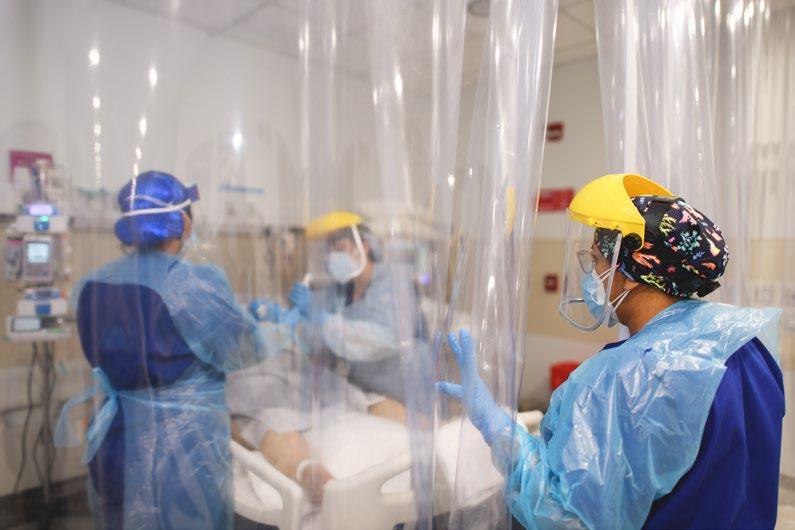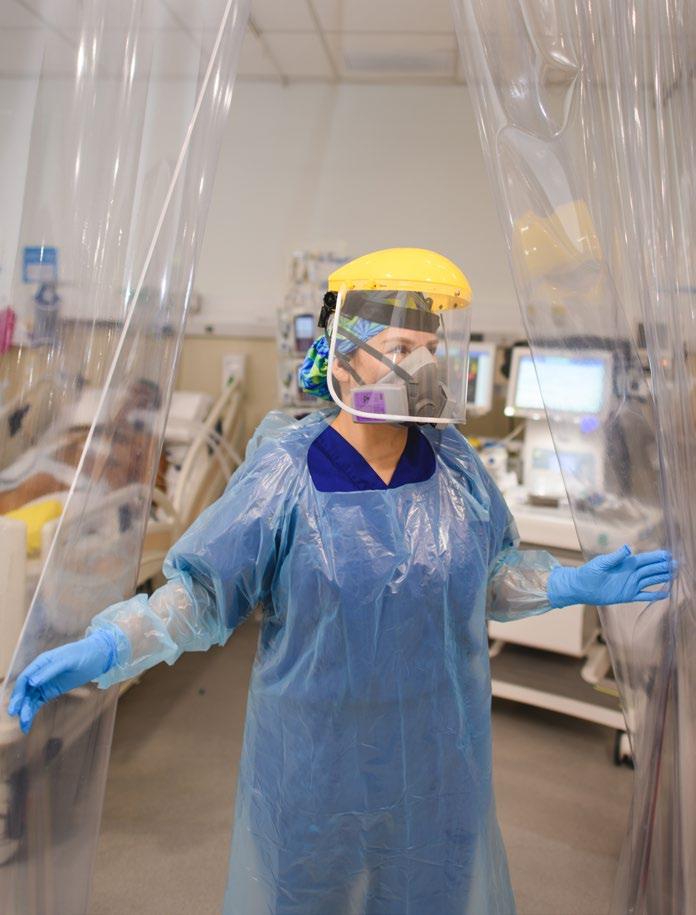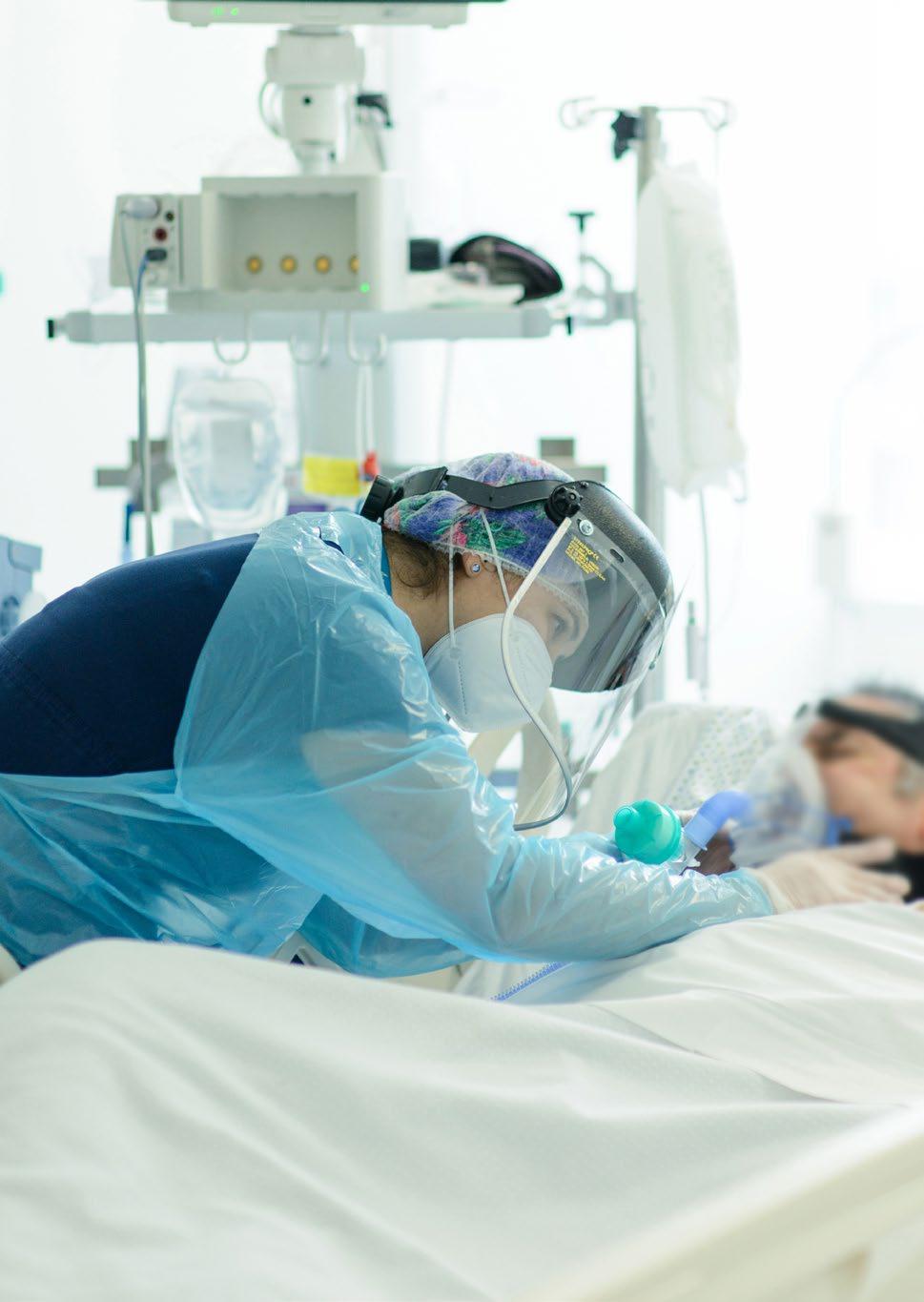
4 minute read
No statistics can show what people have been through
cristina satóstegui Nurse Hospital Sanitas La Zarzuela
I would come home from the hospital and take all the necessary precautions, because my husband is very vulnerable. We have three children. The two boys live with us and our older daughter is studying in the usa. We had to get her back to Spain and that was not easy. The borders were closed. We had a lot of problems, but we managed it in the end. Now I worry about my grandparents who don’t live with us but we do their shopping and they try not to go out. Thanks to my family and their support, I was able to dedicate myself totally to my work. On 9 March, our first Covid patient arrived. He was the only one in icu, where we have twelve beds and two isolation cubicles. I gave all my time to that patient and looked after him every day until he died. He was the first one to die of Covid in the whole hospital. Then it started to fill up. That’s how we ended up with four icu units with different functions. For example, I was transferred from the adult icu to post-surgical icu, and instead of having intensive care assistants we had anaesthetists. There were new doctors, new areas and surgical ventilators. Little by little, we managed to get all that we needed.
The patients coming into the icu at that time came in to be intubated. Their oxygen saturation levels were very low. A lot of them had fever and some had diarrhoea. The patients couldn’t tell us if they had pain anywhere, because they were unconscious. The treatment was very aggressive and caused alterations to the liver. At first, we cared for them face down, but later on that changed. Putting the patient in that position needs a lot of staff and a lot of strength, which we didn’t have towards the end. We started to get used to all the clothes and the heat. You start to feel in control and that cheers you up.
We would have patients from aged 40 years old. There weren’t so many women. About 80% men and 20% women. A lot of them didn’t have underlying illnesses, but others did. Things like obesity and high blood pressure, mainly. We have had people of all ages at this hospital. There are no limits. Some people have been up to 85 years old. I think our death levels have been low, from what I’ve heard from colleagues from other hospitals. But of course, statistics are cold when it comes to talking about what we have been through. As far as consequences for people who have survived, I would say muscular problems are the most common. We set up a physiotherapy
service from the beginning, and patients get it as soon as they stabilise. Instead of one session a day, they get two. There is a morning and an afternoon team. I think this speeds recovery. We had a case where we had to amputate a patient’s leg, but they already had problems with that leg, and they ended up dying. We have had a lot of cases of blockages in the trachea and we have had to ask the pneumologist to come in to treat them and unblock it. All the heads of intensive care in Madrid are working together, both public and private. Whatever a large hospital All the heads of intensive tried and that worked would be passed on to all care in Madrid are working the hospitals. So if someone finds a successful together, both public and treatment, all the procedures change everywhere. Every day was a new world. private. Whatever a large I think Madrid is expected to reach its peak hospital tried and that in mid-September, before the winter. How people have reacted or behaved has depended on different worked would be passed on areas. I think young people and a lot of adults too to all the hospitals. are afraid when someone we don’t know sits beside us on the metro. We protect ourselves with masks. But if we are with a friend, we seem not to worry, and get confident and throw caution to the wind because we are with someone we know. But it shouldn’t be like that. I think it’s very hard for young people to understand. So what I would do was that when I finished at the icu on the surgical floor I would go up and sit with my colleagues and tell them about my morning. The hospital also provided us with a psychologist and we have had group therapy every week. I find out then how my colleagues are. Some are very affected, others are better. We are a very stable team and have been together a long time. We always talk to each other so that hasn’t been hard. I am very thankful at how lucky I have been, firstly because I have never caught Covid. My whole family is well and I have been able to give myself totally to my work, knowing everything else is under control. Except for my daughter’s return, my husband has dealt with everything else at home.�
VALENCIA — SPAIN










